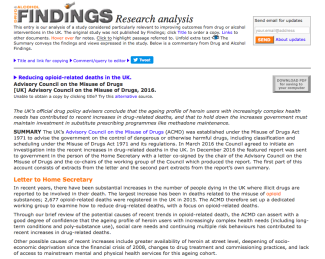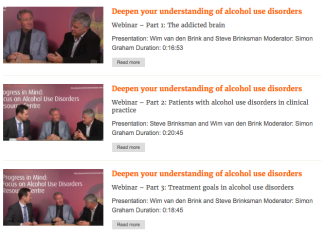Search
Substances
A Scientific Development for the Treatment of Cocaine Addiction?
A new study published in the journal Biological Psychiatry claims that one’s desire for cocaine may be reduced by blocking signalling from a specific system in the brain primarily responsible for promoting wakefulness and appetite.
The...
Emotional Abuse during Childhood Linked to Future Opioid Use
Recently published in the journal Addictive Behaviors, a new study claims the existence of a link between childhood abuse and opioid use later in life.
According to the investigation, emotional abuse, specifically, more so than sexual or...
Reducing Opioid-Related Deaths in the UK
Robust messages for the government from the UK’s official drug policy advisers:
- Ageing profile of multiply-ill heroin users will continue to press up drug-related deaths.
- To counteract this pressure government must maintain investment...
Limited Opportunities? Caring for People with Substance Use Disorders
ISSUP at the 60th Session of the Commission on Narcotic Drugs
Understanding the Brain’s Role in Drug Addiction

Findings recently revealed in Neuroscience & Biobehavioral Reviews and the Journal of Neuroscience suggest the cerebellum is co-responsible for the alterations in the brain that are linked with excessive substance abuse.
This goes...
Sporting Activity and Substance Abuse among Teens: What’s the Link?

A recent survey which looked at the drug habits of over 20,000 US high-school athletes has found those who play high-contact sports, such as hockey, are more likely to use heroin and prescription opioids for non-medicinal purposes.
The...
Public Health Strategies to Prevent Neonatal Abstinence Syndrome: CDC Grand Rounds
Public Health Burden of Neonatal Abstinence Syndrome
Neonatal abstinence syndrome (NAS) is a drug withdrawal syndrome that most commonly occurs in infants after in utero exposure to opioids, although other substances have also been...
Podcast: Do Tobacco Cessation Interventions Provided during Substance Abuse Treatment or Recovery Help Tobacco Users to Quit?
Smoking rates in people with alcohol and other drug dependencies are two to four times those of the general population. Concurrent treatment of tobacco dependence has been limited due to concern that these interventions are not successful...
Effectiveness Bank Matrix Bite: The Talker in the Talking Route to Recovery
In psychosocial therapies, the enactment of the client-worker relationship is the treatment. Structured around Carl Rogers’ classic formulation of the “necessary and sufficient conditions” for therapeutic progress, the cell in the Alcohol...
Can Drug Prevention Programmes Reduce Substance Use by Participants’ Friends?
Opioids Linked to Increase in Cocaine-Related Overdose Deaths
Heroin and synthetic opioids are propelling an upsurge of late in cocaine-related overdose deaths. This is according to a national survey carried out by researchers at the National Institute on Drug Abuse (NIDA) amongst other drug...
Alcohol Use Disorders Webinar
The Progress in Mind Resource Centre held a one-hour webinar on alcohol use disorders. The webinar was delivered by Wim van den Brink, Professor of Psychiatry and Addiction at the University of Amsterdam, and Steve Brinksman, GP and...
The Opiate Epidemic - Free Access Article Collection
Although the abuse of many substances has declined across the globe in recent years, the misuse of prescription and non-medical pharmaceutical opioids has significantly increased. The Taylor & Francis Group, which publishes peer-reviewed...
Synthetic Drugs on the Rise in Afghanistan
Seizures of methamphetamine have increased in Afghanistan, according to a new report from the United Nations drug and crime agency. It also suggests that the drug is being produced inside the country.
The UN Office on Drugs and Crime...
Is There a Link Between a Father's Environment and Drug Tolerance in Children?
A new study published in the journal eLife suggest that a father’s nicotine use could have an effect on children’s risk of some diseases. The investigation found that the offspring of mice routinely exposed to nicotine developed chemical...
Does AA Really Help Drinkers Stop?
12-step fellowships offer a way to reconcile shrunken resources with the desire to get more patients safely out of treatment. Accounting for the self-selection bias which has obscured AA’s impacts, this synthesis of US trials finds that...
Cocaine Addiction Leads to Build-Up of Iron in the Brain
Drugs on the Brain: Neurological Scans Predict Future Substance Use
A new study published in the journal Nature has found that brain scans can predict whether or not teenagers will develop drug taking behaviours later in life.
A sample of 14-year-olds was assessed. The investigation reports that, from an...
Better Working Memory, Less Temptation: Substance Abuse and Neuro-Mechanisms
New research published in the journal Addiction suggests that poor working memory and the inability to control impulses during adolescence are key predictors for future substance abuse. ‘Working memory’ refers to one’s capacity to...
Share the Knowledge: ISSUP members can post in the Knowledge Share – Sign in or become a member






